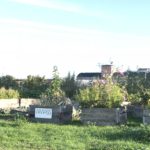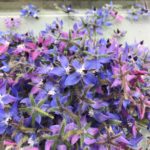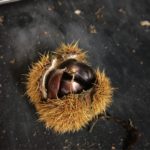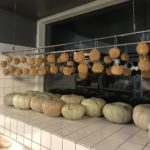
Can you describe what you did during your Stage at Amass Restaurant?
I had the opportunity to work in all five sections of the kitchen (garden, cold, hot, pastry, and bread) in week long increments. I assisted with mise en place during the day and helped plate during service. I was warmly welcomed by the Amass team, and enjoyed learning from and working with each chef. I was able to work with local produce that I had never seen before and learn about preservation as a way to use byproducts.
What stands out as some of the lessons that you learned during your experience?
Amass truly embodies the concept of sustainability and responsibility. Although they are only one restaurant, their impact is felt through each stage that goes through their doors. From day one, I felt that each cook wanted not only to create a wonderful experience for their guests but do so responsibly. There is “no such thing as a byproduct” as they say, because each part of the ingredient is respected and no part is carelessly discarded. Although it is impossible to be 100 percent no waste, they go through the effort of experimenting and finding uses for as many things as possible. For instance, they salt and ferment herb stems to later dehydrate and turn into a seasoning for their potato crisps. They save woodchips that have been used for smoking, and infuse the burnt chips into oil to make a smoky oil. After spending weeks at Amass, I realized that my own thought process has been changed through my time there. I find myself doing a double take before throwing anything in the trash and being aware of the amount of waste that most restaurants produce everyday. I found the relationships between Amass and other local businesses to be very interesting: there were several instances where a farmer or brewer would give Amass their byproduct that they had no use for, and the cooks would find ways to fabricate it into something special. In that same vein, some byproducts from Amass would go to another local business, and the cycle would go on and on. It showed me that so much is possible if everyone works together to just take the time to think before discarding products. These types of relationships create a responsible community.
Recycling is a huge part of working at Amass. There is a proper place to discard everything and recycling is divided into six different categories: soft plastic, hard plastic, garden compost, noncompostable items to be turned into biofuel, paper, and trash. Coming from New York City, where we basically have only trash and recycling, it did take a moment to adjust and understand which items went where.
While staging in the garden, in addition to harvesting plants and herbs for the kitchen, I learned about composting and sustainable organic gardening practices as well as the ecosystem of a greenhouse. I also had the opportunity to go foraging on Refshaleoen for various herbs and flowers to be dried and used for Amass’s tea program and other uses in the restaurant.
Overall, what would you say you achieved through this opportunity?
Completely immersing myself in a kitchen which embodies sustainability and working responsibly has truly been a life changing experience. It has changed how I view our byproducts and expanded the ways I can utilize them here in NYC. I had opportunity to meet many other chefs who mentored me about responsibility and awareness of food waste as a whole in the restaurant industry. I will carry these values with me for the rest of my career.



